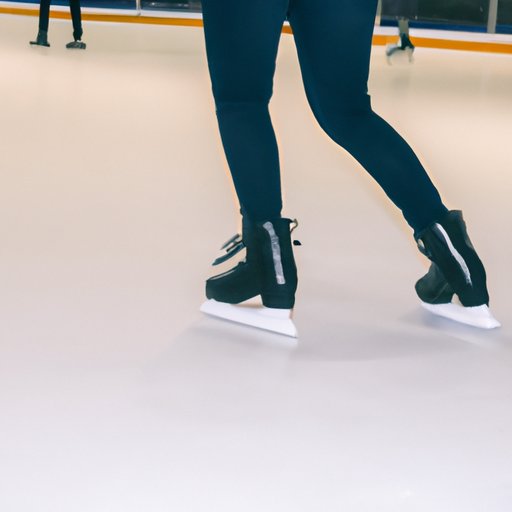Introduction
Ice skating is a popular form of recreational and competitive sport that has been around for centuries. It involves gliding across a sheet of ice while wearing specially designed skates. The skater propels themselves forward by pushing against the ice with their blades. Ice skating is both fun and challenging, and can be enjoyed as a leisure activity or used as a form of exercise.
Many people wonder if ice skating is a good form of exercise. This article will explore the physical and physiological benefits of ice skating, comparing it to other forms of exercise and looking at the calorie-burning potential of this activity. It will also examine how ice skating impacts the musculoskeletal system and compare it to other winter activities.

Comparing Ice Skating to Other Forms of Exercise
Ice skating is often seen as a light form of exercise, but it does provide many health benefits that are comparable to other forms of exercise. Ice skating provides aerobic exercise, which helps to improve overall cardiovascular fitness. It also increases strength and flexibility, and improves coordination and balance. Additionally, it burns calories and can help with weight control.
However, there are some drawbacks to using ice skating as a form of exercise. It is more expensive than other forms of exercise, such as running or cycling. It also requires special equipment and can be dangerous if done without proper instruction. In addition, it is limited to certain climates and seasons, making it difficult to do year-round.

The Benefits of Ice Skating as Exercise
There are many benefits of ice skating as an exercise. One of the most important is its ability to improve cardiovascular fitness. Ice skating is a form of aerobic exercise, meaning that it increases heart rate and breathing rate. This helps to strengthen the heart and improve overall cardiovascular health.
Ice skating also increases strength and flexibility. The movements required for skating require the use of muscles in the legs, arms, and core. This can lead to improved muscle tone and increased strength. Additionally, the stretching and bending involved in skating helps to increase flexibility.
Ice skating also helps to improve coordination and balance. As the skater moves across the ice, they must maintain their balance and adjust their movements accordingly. This helps to develop coordination and balance skills, which can be beneficial in other activities.
Examining the Physiological Impacts of Ice Skating
The physiological effects of ice skating vary depending on the intensity of the activity. During moderate-intensity skating, the body’s metabolism is increased. This means that more energy is being used and more calories are being burned. Additionally, the body’s cardiovascular system is challenged, leading to improved cardiovascular fitness.
At higher intensities, the body’s metabolic rate increases even further. This leads to an increased demand for oxygen, which is supplied by the lungs and heart. This helps to improve overall cardiovascular health and endurance.
Exploring the Calorie-Burning Potential of Ice Skating
The amount of calories burned during ice skating depends on several factors, including the intensity of the activity, the skater’s weight, and the duration of the skate. Generally speaking, a person who weighs 150 pounds can burn approximately 300 calories per hour of moderate-intensity skating. At higher intensities, the number of calories burned increases significantly.
Other factors that affect the amount of calories burned include the type of skate used, the speed of the skate, and the surface of the ice. For instance, skaters who use figure skates tend to burn more calories than those who use hockey skates. Additionally, faster speeds and rougher surfaces require more energy, leading to an increased calorie burn.
Investigating the Musculoskeletal Benefits of Ice Skating
Ice skating can also have a positive impact on the musculoskeletal system. Skating helps to strengthen the core muscles, including the abdominal and back muscles. This can lead to improved posture and better balance. Additionally, skating helps to develop the leg and arm muscles, leading to increased strength and endurance.
The spine is also affected by ice skating. The stretching and bending of the spine during skating helps to keep it flexible and can lead to improved posture. Additionally, the strengthening of the core muscles can help to support the spine, leading to fewer injuries.

Comparing Ice Skating to Other Winter Activities as Exercise
Ice skating is often compared to other winter activities, such as skiing and snowboarding. While these activities do offer some of the same benefits as ice skating, they are not necessarily better. Skiing and snowboarding can be more expensive and require more specialized equipment. Additionally, they are limited to certain climates and seasons.
In comparison, ice skating can be done year-round, in any climate. It is also less expensive and easier to learn than skiing or snowboarding. Additionally, ice skating can be done indoors, allowing skaters to enjoy the activity regardless of weather or season.
Conclusion
Ice skating is a great form of exercise that can provide many physical and physiological benefits. It helps to improve cardiovascular fitness, increases strength and flexibility, and can help with weight control. Additionally, it strengthens the core muscles, develops leg and arm muscles, and keeps the spine flexible. Ice skating is also less expensive and easier to learn than other winter activities.
Overall, ice skating is a great way to stay fit and have fun. It is a great way to get active and enjoy the outdoors, no matter the weather or season. If you are looking for a way to stay fit and have fun, consider taking up ice skating.


